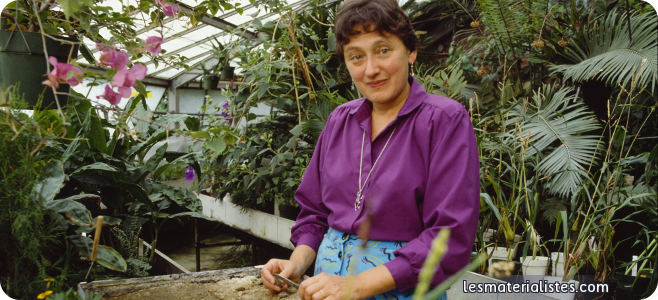3 years without Lynn Margulis
Submitted by Anonyme (non vérifié)
“The intrinsic limitation of Darwinian literature was analyzed in 1999 by Douglas Caldwell, who began with Darwin’s 1859 book itself.
The terms used by Darwin and the number of times those terms appear include: «beat(s)», 17; «death (dying)», 16; «destroy (destroyed, destruction)», 77; «exterminate (extermination)», 58; «individual», 298; «kill (killed, killing)», 21; «perfect (perfection)», 274; «race (races)», 132; «select (selects, selection)», 540; «species», 1803.
By contrast, the following terms are absent from The Origin of Species: association, affiliation,
cooperate, cooperation, collaborate, collaboration, community, intervention, symbiosis.”
(Speech at the university of Barcelona, 2007)
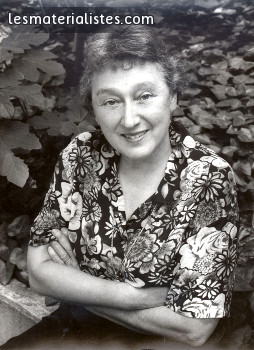 Three years ago, on November 22th 2011, Lynn Margulis died and it meant a terrible loss for science. As a biologist, she practically filled the vacuum that existed in materialism since the discover of DNA.
Three years ago, on November 22th 2011, Lynn Margulis died and it meant a terrible loss for science. As a biologist, she practically filled the vacuum that existed in materialism since the discover of DNA.
The discover of DNA and the ideology that the bourgeoisie built about it – called neo-darwinism – formed a very difficult challenge to dialectical materialism, as it seemed that it was “proven” that individuals exist as such, and that all evolution is based only on individuals. The living world changed because some individuals were fittest, promoting their own “better” DNA, whose difference depended on “random” mutation.
Moreover, it meant that the world, reality as such, had no influence on the individuals, as the DNA decided of all the evolution, without being possibly changed through experiences of the material world. The DNA was here a magic tool, existing besides the material world and deciding of the existence of the living beings.
Showing that the neo-darwinism is a direct prolongation of Darwin's limitations, Lynn Margulis is the one who crushed this ideology. She did it in studying Soviet science from the Lenin and Stalin era. She worked here on two fields. Firstly, the conception of planet Earth as a biosphere, formulated by Vernadsky. This became famous as the “Gaïa” hypothesis.
As Margulis noted:
“Even cosmopolitan thinkers who reject tribalism do not necessarily extend their view to a condemnation of anthropocentrism Most still believe that we humans are the highest of all the animal species. Even more people think that we are not animals at all.
Just as the Bible regards Jews as the chosen people the idea that people are superior to all other life forms is still taken as self-evident. Such traditional human ideas contrast with a Gaian perception of people inextricably, subordinately, linked to the supportive rest of the Earth’s biota.
Despite our self-focus on them, humans are objectively only a fractional and dispensable entity within an immensely complex system of plant, animal and microbial life. This Gaian system was here before we, courtesy of evolution, arrived; and it will be here after we (and our increasingly unrecognizable descendants) are gone.”
(Speech at the university of Barcelona, 2007)
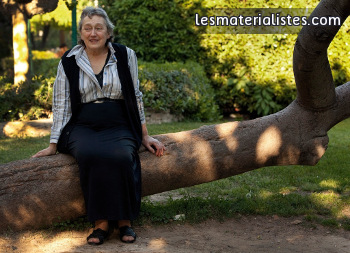 Secondly, Margulis disrupt the bacterial world's understanding as a symbiotic world, following the path started by Konstantin Mereschkowski (1855-1921) and spread out by Boris Kozo-Polianski (1890-1957).
Secondly, Margulis disrupt the bacterial world's understanding as a symbiotic world, following the path started by Konstantin Mereschkowski (1855-1921) and spread out by Boris Kozo-Polianski (1890-1957).
It means here that Margulis formulated the concept of dialectical synthesis in the bacterial world, giving a genuine materialist explanation of what is life. With Margulis, we have finally a materialist, even a dialectical materialist, understanding of the principle of evolution.
Contrary to the bourgeois perspective, life is a process of qualitative leap and merging.
Like she said in “Marvellous microbes”, written with Dorion Sagan (her son with the famous scientist Carl Sagan): “Life did not take over the globe by combat, but by networking”.
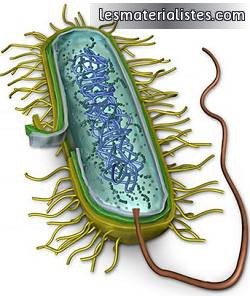 This is the principle of symbiogenesis. Symbiogenesis is the path of matter, in its dialectical evolution. Matter connects itself to matter, forming organisms that are always more complex.
This is the principle of symbiogenesis. Symbiogenesis is the path of matter, in its dialectical evolution. Matter connects itself to matter, forming organisms that are always more complex.
Through this conception of the evolution with merging, Lynn Margulis has been one of the two persons who revolutionize the living things' classification in the 70's. She proposes to set as most crucial super-reigns of procaryotes (bacteria and archeabacteria) and eukaryotes (other living things), because the second one results from the merging of the first one.
Margulis make the following hypothesis: the first eukaryotes cells descended from the merging of at least two bacteria, giving birth to cellular nuclear – distinguishing feature of eukaryotes. Then, these new cells have merged with other bacteria, proteobacteria using oxygen and cyanobacteria using photosynthesis, producing now common eukaryotic cells.
Here is how she presents this conception:
“To proceed we need to explain how the ecological concept of «symbiosis» differs from the evolutionary term “symbiogenesis”. Symbiosis refers to the living together of organisms of different species.
Endosymbiosis, a topological condition, is a kind of symbiosis where one partner lives inside of another. Symbioses usually, if not always, have environmentally contingent outcomes.
Symbiosis, not an evolutionary process per se, refers to physiological, temporal or topological associations with environmentally determined fates.
Symbiogenesis, however, implies the appearance of new tissues, new organs, physiologies or other new features that result from protracted symbiotic association.”
(Speech at the university of Barcelona, 2007)
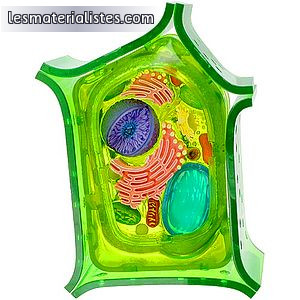 Margulis's work was recognized and acclaimed in some fields; nevertheless, she generalized the perspective, considering all life as a similar process. This is was of course not accepted and we'll have to wait that socialism won in a country so that this conception is fully accepted.
Margulis's work was recognized and acclaimed in some fields; nevertheless, she generalized the perspective, considering all life as a similar process. This is was of course not accepted and we'll have to wait that socialism won in a country so that this conception is fully accepted.
Her model is conform to dialectical materialism: life is a process of always more complexity, with qualitative leap and merger. Therefore, the human being itself is the product of a long process of fusion of different elements.
In accordance with dialectical materialism, the process of fusion means a qualitative leap: it's not an association, but a merger. Whence the distinction's big value, made by Margulis in her speech, between symbiosis (so beings living together without merging) and symbiogenesis.
This point is very important and is, in fact, the classical divergence between anarchism and communism. Anarchism believes in association as the unique process whereas communism knows that the universal process is the one of fusion to always more complex living beings.
